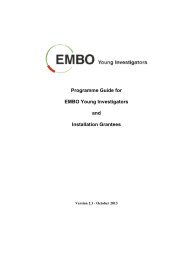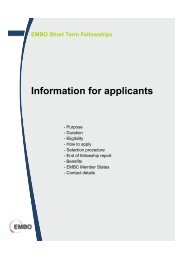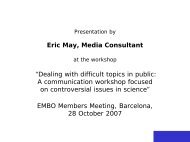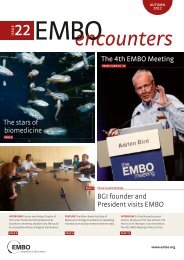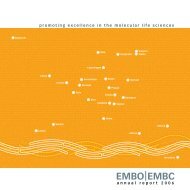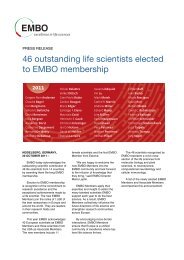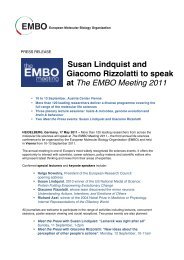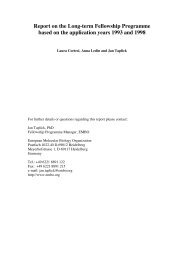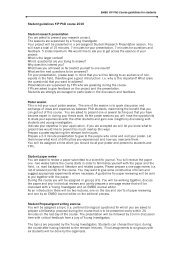EMBO Fellows Meeting 2012
EMBO Fellows Meeting 2012
EMBO Fellows Meeting 2012
Create successful ePaper yourself
Turn your PDF publications into a flip-book with our unique Google optimized e-Paper software.
Joana Marques<br />
<strong>EMBO</strong> <strong>Fellows</strong> <strong>Meeting</strong> <strong>2012</strong><br />
A stable RNAi knockdown system to study epigenetic regulators of pluripotency in<br />
mouse ES cells<br />
Abstract<br />
Embryonic stem (ES) cells are in a pluripotent state that is epigenetically regulated by DNA methylation and<br />
other chromatin modifications. We are using a stable and inducible RNAi knockdown system in mouse ES cells<br />
to interrogate the function of potential epigenetic regulators of pluripotency. In this ICE (Inducible Cassette<br />
Exchange) system (Iacovino et al., 2011), we use a genetically engineered mES cell line (A2lox.cre) that allows<br />
the stable integration, by Cre-mediated site-specific recombination, of an shRNA-mir cassette near the<br />
constitutively active HPRT locus under a tetracycline-regulatable promoter. The system has been successfully<br />
used to generate a stable Tet1 shRNA cell line that allowed us to investigate the function of Tet1 and DNA<br />
hydroxymethylation in regulating the balance between pluripotent/lineage commitment states (Ficz et al.,<br />
2011). Several pluripotency genes were downregulated together with Tet1, namely Ecat1, Esrrb, Klf2, Fbxo15,<br />
Tcl1 and Zfp42, showing increased levels of DNA methylation. Recovery of Tet1 expression resulted in<br />
restoration of expression and methylation levels of the above pluripotency genes. These results suggest that<br />
Tet1 actively regulates the pluripotent state, possibly by maintaining appropriate levels of DNA methylation at<br />
pluripotency genes. We are now establishing stable shRNA lines for several potential epigenetic regulators of<br />
pluripotency, identified by a genome-wide promoter methylation analysis and showing high levels of<br />
expression in key developmental stages for epigenetic reprogramming.<br />
References:<br />
Iacovino et al., Stem Cells 2011; 29:1580-1587; Ficz et al., Nature 2011; 473:398-402.<br />
Lab of Developmental Genetics and Imprinting, Babraham Institute, UK; Neurosciences Research Domain, ICVS, University<br />
of Minho, Portugal<br />
14-17 June <strong>2012</strong>, Heidelberg, Germany



